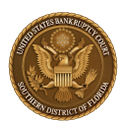(A) Notice of Hearing. Preparation by Clerk for Service by Required Party. Except for those matters self-calendared under section (C) of this rule, for any paper filed requiring a hearing, the clerk will prepare a notice of hearing and return it to the party required to serve the notice within the time required by any applicable rule or order of the court, either electronically via the NEF or by mail from the BNC, depending on whether the attorney for the movant is a registered user who has filed an electronic notice of appearance in the case or proceeding.
(B) Filing of Certificate of Service of Notice of Hearing. No certificate of service is required when all parties entitled to service of a notice of hearing have received service by CM/ECF. In such instances, the docketed notice of hearing constitutes sufficient proof of service of the notice of hearing for the requested relief. If, however, a notice of hearing is required to be served on one or more parties who do not receive CM/ECF service, then the movant must serve that notice of hearing and file a certificate of service as required under Local Rule 2002-1(F); failure to do so may result in the request for relief being denied without further notice or hearing. If a certificate of service is not filed by the movant, it will be treated as a representation by the movant that all interested parties have been served through CM/ECF.
| ☞ 2021 Amendment: Local Rule 9073-1(B) is amended to provide that when all parties to a motion set for a hearing were not served by a NEF, a Local Form Certificate of Service is required to be filed as required under Local Rule 2002-1(F) and that failure to do so may result in that request being denied without further notice or hearing. |
| ☞2020 Amendment: Local Rule 9073-1(B) removes the requirement of filing a certificate of service for a notice of hearing when all interested parties are receiving service via the Court’s CM/ECF. If this rule is amended, the movant would only be obligated to serve the notice of hearing (and file a certificate of service of the same) for parties who are not receiving service via CM/ECF). |
(C) Self-Calendaring of Certain Matters. The court has issued guidelines for self-calendaring. Attorneys and trustees who self-calendar hearings must serve notice and file a certificate of service as required by subsections (A) and (B) of this rule. If the self-calendaring option is used to schedule a hearing on a motion for relief from stay, and the next available hearing date is scheduled beyond the 30 or 60 day provisions set forth in 11 U.S.C. §362(e), the movant will be deemed to have consented to voluntarily extending the deadline to the date of the next available calendar.
(D) Conference with Opposing Attorneys Required. If a motion seeks relief involving the trustee, a debtor that is represented by an attorney, or another adverse party that is represented by an attorney, and that attorney has appeared in the case or proceeding, the motion must include a certification that the movant's attorney has contacted counsel for all adverse parties to attempt to resolve the matter without hearing. This requirement does not apply, however, to a motion or application that is required to be served on all creditors and parties in interest in the case or proceeding under the Bankruptcy Rules, these Rules, or by order of the court.
[Comment: See also Bankruptcy Rule 9011 (effect of signature) and Local Rules 7026-1(E) (motions to compel discovery) and 9076-1 (electronic service).]
| ☞ 2021 Amendment: Local Rule 9073-1(D) is amended to require, under certain circumstances, motions on matters which will be set for hearings to include a certification that the movant's attorney has contacted counsel for all adverse parties to attempt to resolve the matter without hearing. (See Administrative Order 2021-08). |
(E) Notice of Pending Matters. With respect to any motion, application, or other matter:
(1) as to which the Court has conducted a hearing, but has neither set a subsequent hearing nor entered an order or otherwise determined the motion, application, or other matter within ninety (90) days of the last hearing directed to such motion, application, or other matter, or
(2) that is pending and fully briefed with no hearing set thereon for a period of ninety (90) days, the movant or applicant must serve on all parties and other interested persons within fourteen (14) days thereafter a “Notice of Matter Pending for Ninety Days” which must contain (a) the title, docket entry number, and filing date of the subject motion or other application, (b) the title, docket entry number, and filing date of any and all responses, opposing or supporting memoranda, replies, or other substantive papers directed to the motion or application, or if no such papers have been filed, the date on which such papers were due, and (c) the date(s) of any hearing(s) held on the motion, application, or other matter.
| ☞ 2020 Amendment: Amendment creates an additional provision to Local Rule 9073-1 (Section “E” – Notice of Pending Matters). This rule is adapted from the district court’s rule 7.1(b)(4) and, like the district court’s rule, requires that the notice be filed by the movant or applicant when 90 days have elapsed after a matter is fully briefed if there is no hearing or, if there is a hearing, after the hearing. Language is added to recognize the possibility of a subsequent hearing. New Section 1(E) retains the district court’s language that makes the notice a requirement rather than an option, and also retains the 90 day time period). |
